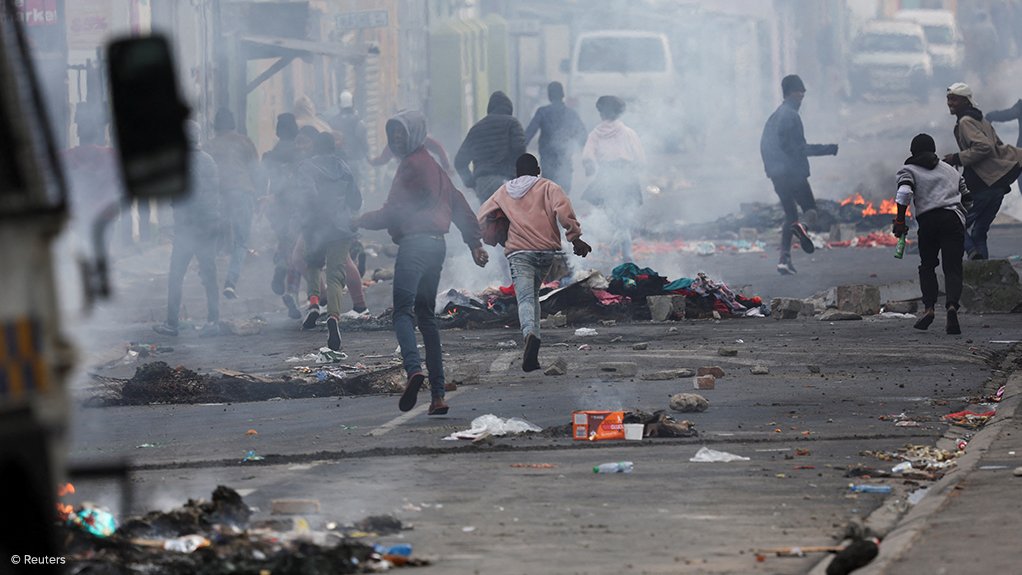Resolution of taxi strike met with strong collective approval
The South African National Taxi Council (Santaco) has put an end to its industrial action with immediate effect, following a meeting with the City of Cape Town to find amicable solutions that address Santaco's grievances arising from the municipality’s new by-laws, such as impoundment for driving unroadworthy vehicles, and driving without a licence or visible number plates.
The taxi strike has been marked by violence, resulting in deaths and the destruction of property.
The Department of Transport, on Friday, welcomed the end of the strike and stressed the need for the rule of law to be upheld, ensuring the smooth functioning of public transportation systems. The Department will actively follow any developments arising from further discussions within the 14-day turnaround time set in place.
Within this time, a taxi task team will come up with a list of major offences that should result in impoundment and of minor offences for which fines should be issued.
“The Minister and the government deeply regret the adverse effects the strike has had on learners, workers, and all those affected in Cape Town and its surrounding areas. The disruption caused by the impasse has had a negative effect on the local economy, and the Minister acknowledges the challenges faced by individuals who rely on public transportation for their daily activities,” said Department spokesperson Monageng Mokgojwa.
The City of Cape Town expressed its appreciation for the constructive approach taken by Santaco but decried the implications the strike has had in terms of the destruction of lives, property and the local economy. They opined that Santaco gained nothing from the strike, noting that they had accepted the same proposal that the municipality originally set forth a week ago.
“It is time for Santaco and for all South Africans to take to heart the lesson from the past week: violence will get us nowhere. While we deplore the impact of this entirely unnecessary strike, Cape Town has set an important precedent for South Africa’s future. By steadfastly refusing to capitulate before violence and anarchy, Cape Town has not conceded an inch on our commitment to the rule of law. The message is clear: in Cape Town, the laws of this country apply equally to everyone and violence will not extract a single concession from this government,” argued Cape Town Mayor Geordin Hill-Lewis.
The South African Communist Party (SACP) has commended the leadership demonstrated in resolving the strike and advocated for the arrival at a decision that considered the interests of the working class.
“In the course of the strike, lives, livelihoods and wages were needlessly lost, and both public and private property was damaged. Although this resolution has come at a later stage than we would have wanted, it is better late than never. The strike demonstrated that we are all interconnected, even across divides of race and class. Even though it was the working class who suffered the most, the taxi strike interrupted the supply chain to the extent that all citizens in the Western Cape felt the ripple effect,” said SACP provincial secretary Benson Ngqentsu.
The SACP has also called for a Public Transport Indaba to be held within three months to address the structural challenges facing the public transport system.
Parliament’s Portfolio Committee on Transport has welcomed Santaco’s agreement with the Western Cape government and urged the municipality not to renege and make unilateral statements. The Committee opined that the new agreement would greatly assist commuters and implored stakeholders to consider the painful consequences of the strike, especially for poor people.
“Everything possible should be done to make sure that there is certainty in the taxi industry, especially because so many people in townships rely on effective taxi services for commuting between workplaces and their homes, as well as learners who attend school in town,” said Transport Portfolio chair Mina Lesoma.
Article Enquiry
Email Article
Save Article
Feedback
To advertise email advertising@creamermedia.co.za or click here
Announcements
What's On
Subscribe to improve your user experience...
Option 1 (equivalent of R125 a month):
Receive a weekly copy of Creamer Media's Engineering News & Mining Weekly magazine
(print copy for those in South Africa and e-magazine for those outside of South Africa)
Receive daily email newsletters
Access to full search results
Access archive of magazine back copies
Access to Projects in Progress
Access to ONE Research Report of your choice in PDF format
Option 2 (equivalent of R375 a month):
All benefits from Option 1
PLUS
Access to Creamer Media's Research Channel Africa for ALL Research Reports, in PDF format, on various industrial and mining sectors
including Electricity; Water; Energy Transition; Hydrogen; Roads, Rail and Ports; Coal; Gold; Platinum; Battery Metals; etc.
Already a subscriber?
Forgotten your password?
Receive weekly copy of Creamer Media's Engineering News & Mining Weekly magazine (print copy for those in South Africa and e-magazine for those outside of South Africa)
➕
Recieve daily email newsletters
➕
Access to full search results
➕
Access archive of magazine back copies
➕
Access to Projects in Progress
➕
Access to ONE Research Report of your choice in PDF format
RESEARCH CHANNEL AFRICA
R4500 (equivalent of R375 a month)
SUBSCRIBEAll benefits from Option 1
➕
Access to Creamer Media's Research Channel Africa for ALL Research Reports on various industrial and mining sectors, in PDF format, including on:
Electricity
➕
Water
➕
Energy Transition
➕
Hydrogen
➕
Roads, Rail and Ports
➕
Coal
➕
Gold
➕
Platinum
➕
Battery Metals
➕
etc.
Receive all benefits from Option 1 or Option 2 delivered to numerous people at your company
➕
Multiple User names and Passwords for simultaneous log-ins
➕
Intranet integration access to all in your organisation



















